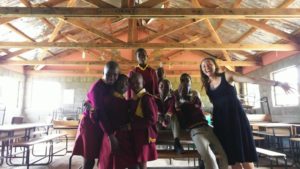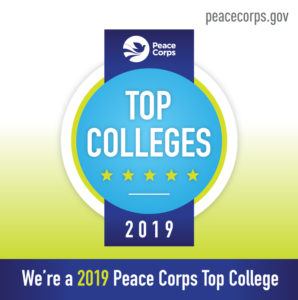Pasha was cutting a heart from a piece of paper when his scissors slipped and his finger started to bleed. The wound didn’t hurt the middle-school boy as badly as the words of his classmates, who – worried that Pasha could have HIV – shrieked in fright that his blood might infect them. He started to cry.

Peace Corps volunteer Carrie Maggio ’17 was leading the youth club session in Lesotho, inside South Africa, where nearly a quarter of the population has HIV. She pulled Pasha aside to give him a Band-Aid – and some advice. He’d need to decide, Maggio told him, how to react when people teased him. After that, Pasha found his place in the class, trading his seat at the back of the room for one up front. He started to shine.
“I find fulfillment in the fact that I could have been a positive role model in his life,” said Maggio, one of 10 Mary Washington grads currently serving in the Peace Corps across the world – from South America, to Africa, to Europe and Asia. Once again the University’s alumni commitment to global service has earned UMW recognition as a Peace Corps top producer.
Mary Washington took the 15th spot among U.S. schools with fewer than 5,000 students. The distinction marks the 11th consecutive year UMW has made the top 25. More than 260 Mary Washington alums have served the Peace Corpssince its 1961 inception.

“There is a long-standing tradition of Mary Washington students involving themselves in public service and in their local communities,” said Center for International Education Director José Sainz, who helped launch UMW’s Peace Corps Prep program in fall 2017. “Serving in the Peace Corps is the next logical pathway for those who seek to make a difference in the world.”
That’s what UMW senior Chloe Morton hopes to do when she heads to Costa Rica this summer. A psychology and chemistry double major, she’ll teach English as a Foreign Language, working with children and teachers to improve language skills and lesson plans.
UMW’s prep program has helped equip her for the role she will play in South America. It’s four-pronged approach – training and experience, foreign language proficiency, intercultural competence, and professional development and leadership – had Morton taking additional classes and made her Peace Corps application stand out.
“I hope to use my fluency, taken from my time in Costa Rica, to work with Spanish-speaking immigrants here in the U.S.,” said Morton, a volunteer with Mary Washington’s Peer Assisted Study Sessions. “I would like to develop skills for running my own afterschool clubs for students and branch outand teach other subjects, like physical health.”
That’s Maggio’s focus, as well. As a healthcare volunteer in Lesotho, she works at the local clinic and on long-term community projects, and helped organize the area’s first-ever HIV testing event last year.
“We’ve already begun planning for this year,” she said, “and it will only get better from here.”
The Peace Corps is a U.S. government-administered group that promotes cross-cultural understanding and global service. Each volunteer’s experience is different, said Maggio, who majored in art history at Mary Washington. It depends on perspective, passion and perseverance, and she’s pouring all those into her time in Lesotho.
“I’ve supported a community of people and been able to witness some incredible things,” she said. “I’ve learned a lot and feel I’ve received way more than I’ve given.”
To hear Maggio’s conversations with other Peace Corps volunteers, tune in to her podcasts.



